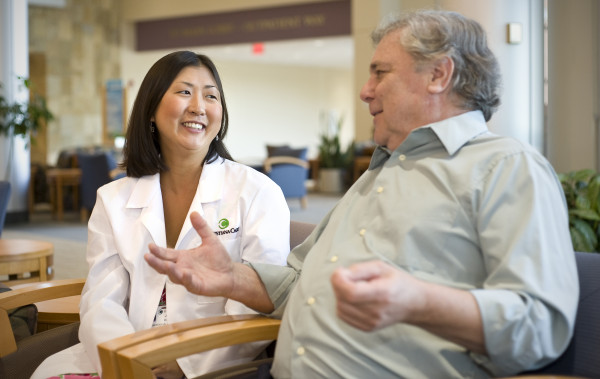Innovative Bridges program shows the future of care management

A series of ischemic cardiovascular events in the life of Robert Cyr of New Castle led to the retired carpenter and mechanic enrolling in an innovative program at Christiana Care called Bridging the Divides — or Bridges for short.
Bridges offers intensive case management to patients with heart disease who are likely to encounter obstacles to recovery at home after hospital procedures.
“I’m super happy with the followup and the help I’ve gotten with prescriptions and other things,” said Cyr, 70.
A single man who lives alone, he especially appreciates that Julia Murphy, a social worker with the Bridges program, calls to check in every Wednesday.
“It’s easy to get depressed,” he said. “Her calls really help. She’s even given me ideas for looking for work.”
Bridges began in July 2012 and is part of a three-year grant funded for $10 million by the Center for Medicare and Medicaid Innovation. Christiana Care’s innovative proposal was selected as one of only 107 projects chosen by CMMI from a nationwide pool of 3,000 applications.
The Bridges program, which includes more than 2,200 ischemic heart patients, was funded to harness new information technology and offer more coordinated case management than has been possible in the past.
The care management team is known as Care Link Services and includes social workers, nurses, a pharmacist, a health ambassador, a care management supervisor and a physician adviser.
“We support physicians in making sure patients follow the medical plan of care,” said William S. Weintraub, M.D., MACC, FAHA, FESC, the John H. Ammon Chair of Cardiology and one of the chief investigators in Bridges.
As a cardiac patient plans to transition home or into a rehab, the Care Link team explains medication, schedules future doctor appointments and makes sure other services are in place.
At home, daily readings of weight, blood pressure and oxygen saturation may be collected. The readings alert Care Link Services to potential problems. Ongoing data collection helps the care team to adjust treatments as needed.
“We follow patients very closely, and they get a call if something doesn’t look right,” said Victoria Jones, BSN, RN, case manager.

Bridges is a model Christiana Care program that uses software to concentrate data so the system is smart enough to offer customized care, said Terri Steinberg, M.D., MBA, chief medical information officer for Christiana Care.
A cardiologist might say to come back in a month, but when a result, such as a high blood pressure reading, hits the database with the patient’s record, an automated action can be triggered for the care managers to act. In this way the system is reactive, not prescriptive, Steinberg said.
The system also has analytic capabilities to look at data points that are common for patients when they are readmitted. This is a level of analysis that care managers have not previously been able to use, Steinberg said.
The system is designed to tap into several databases. These include the Delaware Health Information Network, which offers more than 90 percent of lab results statewide, and best practices data collected in registries of the American College of Cardiology and the Society of Thoracic Surgery.
This fall, Bridges will introduce an electronic portal that patients and families can use for direct e-mail communication with Care Link Services. This secure online connection will offer access to a patient’s medical record and is geared toward greater self-management.
“A patient will be able to interface with a case manager, social worker, pharmacist or other provider to support them in improving their health and meeting their needs when they have a concern,” said Sharon Anderson, BSN, RN, MS, senior vice president of Quality and Patient Safety.
She said the Bridges program is fully aligned with The Christiana Care Way, because it is an innovative program that is providing an opportunity to partner with our patients to improve their health. Ultimately, the program will improve our patient’s health status, and reduce emergency-room visits and hospitalizations. This in turn drives down costs and improves value. The Bridges grant and Care Link Services provide a vehicle to change the way we deliver care and is a foundation for the future. Payment reform supports longitudinal care with much more of an outpatient focus. The state of Delaware is ready to reward this type of medical care, she said.
According to the state’s Health Care Innovation Plan released in December 2013, the state proposes, within five years, to transition to an outcomes-based payment model with 80 percent of the population receiving care through this type of system.
By 2019, the goal is for Delaware to be one of the five healthiest states in the nation and to reduce health care costs by six percent, according to the plan. It calls for linking financial rewards for health systems, like Christiana Care, to successful medical outcomes.
To do this, the state proposes technology-enabled patient engagement, particularly for high-risk individuals in the greatest need for intensive care coordination.
Anderson said that so far the good news for Care Link is that patients report being very satisfied with the program, and the program’s effectiveness is continuously being measured in conjunction with CMS.
“Care Link is really our strategy for care management, which supports population health management programming going forward,” Anderson said.